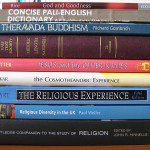Last month I covered the revived discussion amongst Buddhists in North America about psychedelic drug use. One fascinating aspect of this work was seeing the various forms of reasoning used by those involved in the debate.
In the study of ethics, forms of reasoning are important.
- If the Buddhists had focused heavily on the intentions of the psychedelic drug users, they might have had what we’d call deontological moral frameworks.
- If the Buddhists had focused on the character development of those involved or resulting in the drug use, they might have had virtue ethics in mind.
- And if the Buddhists had focused on the results or consequences of the drug use, they would have displayed consequentialist modes of thought.
But instead what we have is a complex mixture of modes of thinking. What’s going on? Do Western Buddhists have ethics? Do they simply follow liberal trends mindlessly? Or is something a little more interesting and complex happening?
Here we get some help from Jay Garfield, an expert on… Buddhist ethics. He writes that Buddhist ethics, “represents a distinct moral framework addressed to problem-solving that takes action not to issue from a free will bound by laws, but from a dependently originated, conditioned continuum of causally interdependent psychophysical processes.”
Further:
It takes the relevant consequences of action not to be pleasure and pain conceived of as introspectible experiences of persons, but to be states of sentient continua of genuine suffering, that which conduces to suffering, genuine liberation, or that which conduces to genuine liberation, whether or not those are desired or detested, or experienced as desirable or detestable by the sentient beings imputed on the basis of those continua.
We saw precisely this combination of considerations in the varied arguments around the use of psychedelic drugs: are they done just for pleasure? Do they really lead to dispassion and freedom from suffering? Are the persons involved with them typically otherwise good people? Do people who use psychedelic drugs use the experience to later turn toward a better (Buddhist) life?
These are the kinds of rich philosophical and ethical questions that Western Buddhists actually are asking. This highlights the importance of academic study for not only describing how Buddhists have argued about complex moral issues in the past but also for essentially predicting how Buddhists would reason about a tough moral issue in the future.
Kudos, Jay Garfield.
See Professor Garfield discussing Buddhist ethics at a recent conference:
However, Garfield isn’t alone in his study and exploration of Buddhist ethics.
There are several other influential approaches to Buddhist ethics (which I hope to write about here during my time as a Visiting Lecturer at Hong Kong University over the next 3 months). Foremost among those is Damien Keown’s Aristotelian comparison, which has led to several books and articles, along with a consequentialist approach championed by Mark Siderits, Charles Goodman, and others, which have likewise driven much thought.
Buddhist ethics as Gradualism
Another, somewhat sleepy but influential theory, is that of gradualism: wherein different modes of reasoning, along with expectations and responsibilities, apply at different stages of moral development in the individual. This was first developed by the late Lance Cousins and accepted by Peter Harvey in his influential Introduction to Buddhist Ethics, but it hasn’t been given a great deal of academic discussion that I know about.
Explaining the development of reasoning, we can turn to Bhante Henepola Gunaratana, who writes in his Mindfulness in Plain English:
To understand this relationship more fully, let us propose that there are levels of morality. The lowest level is adherence to a set of
rules and regulations laid down by somebody else. It could be your favorite prophet. It could be the state, the head of your tribe, or a parent. No matter who generates the rules, all you have to do at this level is know the rules and follow them…The next level of morality consists of obeying the same rules even in the absence of somebody who will smack you. You obey because you have internalized the rules. You smack yourself every time you break one. This level requires a bit of mind control. But if your thought pattern is chaotic, your behavior will be chaotic, too. Mental cultivation reduces mental chaos.
There is a third level of morality, which might better be termed as “ethics.” This level is a quantum leap up the scale from the first two levels, a complete shift in orientation. At the level of ethics, a person does not follow hard and fast rules dictated by authority. A person chooses to follow a path dictated by mindfulness, wisdom, and compassion. This level requires real intelligence, and an ability to juggle all the factors in every situation to arrive at a unique, creative, and appropriate response each time. Furthermore, the individual making these decisions needs to have dug him- or herself out of a limited personal viewpoint. The person has to see the entire situation from an objective point of view, giving equal weight to his or her own needs and those of others.
This is just one possible version of gradualism
But the gradualist emphasis here is on the way a person relates to ethics (variously termed) depending on their moral development. You can get a sense of where you or others are at depending, for instance, on the extent of your clinging to rules and rituals.
This model of Buddhist ethics could be used to analyse the various views expressed on psychedelics. Those who focused heavily on rules (is it legal, is it illegal / is it in accordance with Buddhist precepts, bodhisattva vows, etc) might be placed at the lowest level.
In the next level one simply follows the rules (emphasis on the activity of following the rules) and can turn his/her thought to analysing them, their applicability, reasonableness, appropriateness, and so on. It is precisely by following the rules that one is capable of better understanding them and, indeed, questioning them from different angles. It’s like learning to drive: at first we cannot think too much about why certain areas have this or that speed limit or passing rules, we’re too busy just focusing on learning to follow them. After a while we can start asking questions about the reasoning behind the rules.
Third in the psychedelics debate would be those willing to show a real sensitivity to the issue, perhaps recognizing that at first they are attracted to the idea of psychedelics and then, upon reflection, have decided against using or promoting them. Or the opposite, perhaps they initially opposed the idea but, upon reflection and perhaps conversation (as one writer quoted in my article talked about), they’ve opened their understanding to embrace a broader viewpoint in which psychedelics might be a “unique, creative, and appropriate response” to a person’s dukkha (suffering). And just as she brought up use of antidepressants, others elsewhere raised the question of ‘medicines’ and substances that create a spectrum of ‘mind alterations’.
To people at the first level, such sensitivity and openness might seem absurd; “why think for yourself when there are RULES!?” For them, ethics just is following the rules; thinking about or discussing topics like this can thus itself be seen as unethical or promoting unethical behavior.
However, this is very clearly an aspect of Buddhist ethics according to this gradualist approach.
Failing to understand this and other theories of Buddhist ethics, one could easily fail to catch the nuances of this and other debates in Buddhism today.
Photo by Ryoji Iwata on Unsplash.














